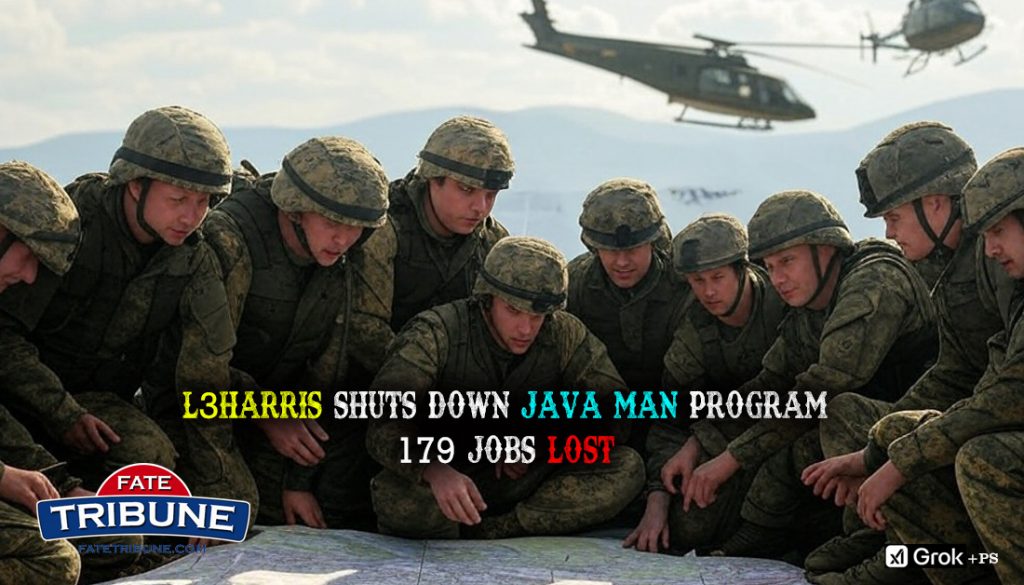ROCKWALL, Texas — L3Harris Technologies, a titan in the defense contracting world, has dropped a bombshell: 179 jobs tied to its Rockwall facility are slated for the chopping block. The layoffs, announced via a Worker Adjustment and Retraining Notification (WARN) notice on February 20, 2025, and set to unfold between April 22 and June 30, mark the end of the JAVA MAN program, an aerial intelligence, surveillance, and reconnaissance (ISR) initiative. For a county of just over 100,000 souls—many of whom rely on the stability of such employers—this isn’t just a corporate shuffle; it’s a gut punch to the heart of Texas self-reliance.
According to The Dallas Morning News (February 28, 2025), L3Harris, headquartered in Melbourne, Florida, employs about 48,000 globally, with a hefty Texas footprint—15 locations and roughly 7,900 workers as of mid-2021. The Rockwall layoffs, though a sliver of that total, sting locally. The JAVA MAN program’s closure, confirmed by company spokesperson Sharon Parsley, isn’t tied to some grand conspiracy of military budget slashing or foreign aid flip-flops—despite whispers of such in the wake of President Trump’s January 2025 executive order suspending most foreign aid, including Ukraine’s lifeline, for 90 days. No, this is simpler: a program ran its course, and now Rockwall County pays the price.
Rockwall County, with its median household income of $111,024 (U.S. Census Bureau, 2023 estimates), thrives on the kind of grit and ingenuity L3Harris once promised. The company’s Texas workforce boasts an average salary north of $100,000—jobs that fuel families, fund schools, and keep the tax base robust. Lose 179 of those, and the ripple effects aren’t hypothetical; they’re real. High-wage jobs like these prop up local businesses—restaurants, shops, contractors—and when they vanish, the hole is felt county-wide.
For the moment, L3Harris isn’t abandoning Rockwall entirely. Only 31 of the 179 affected workers are in-state; the rest, per the WARN notice, are out-of-state remote employees, many overseas. Still, those 31 local losses—pilots, logistics folks, maintenance crews—aren’t faceless stats. They’re neighbors, churchgoers, taxpayers. And while the company touts efforts to reassign them internally, the reality is murkier.
What’s the bigger picture? Some might point fingers at Washington—say, the looming shadow of Trump’s Department of Government Efficiency (DOGE), tasked with trimming federal fat. Pentagon brass, per The Wall Street Journal (March 4, 2025), are already drafting lists of expendable programs. Could JAVA MAN’s demise be a preemptive casualty? Doubtful. The timeline doesn’t align; L3Harris’s decision predates DOGE’s full bite. More likely, this reflects corporate calculus—JAVA MAN, with its $75 million in Air Force contracts (HigherGov data), simply didn’t pencil out long-term. Yet that cold logic doesn’t soften the blow for Rockwall.
Constitutional conservatives champion limited government, but we also know prosperity hinges on opportunity. L3Harris’s retreat raises questions: Where’s the state’s response? Texas, under Governor Greg Abbott, has bragged about its business-friendly climate—low taxes, light regulation. But when a defense giant like L3Harris pulls back, where’s the cavalry? The Texas Workforce Commission offers retraining, sure, but that’s a Band-Aid on a broken system.
L3Harris claims its Texas business is “growing,” per Parsley’s statement to The Dallas Morning News. They’re hiring elsewhere—Greenville, Plano—while Rockwall gets the axe. That’s the free market’s double edge: ruthless efficiency, zero sentimentality. For a county that prides itself on bootstrap values, it’s a bitter pill. And with the national defense budget still ballooning—$886 billion in 2023, per the Congressional Budget Office—why does Rockwall feel the squeeze? Maybe it’s not about cuts but priorities. ISR programs like JAVA MAN might not dazzle in a world of hypersonic missiles and AI drones.
So, what’s next for Rockwall County? Resilience, for one. This isn’t a death knell—yet. The county’s unemployment rate hovers at 3.5% (Texas Workforce Commission, January 2025), well below the national 4.1%. But losing high-skill, high-wage jobs tests that grit. Local leaders must double down on attracting new players—tech, manufacturing, anything—to fill the void. And Texans, ever wary of federal overreach, should demand answers: If defense dollars flow, why not here?
This isn’t just about L3Harris. It’s about a principle: Government shouldn’t pick winners and losers, but it darn well shouldn’t let communities like Rockwall wither when the private sector shifts gears. For now, 31 local families face uncertainty, and a county holds its breath. That’s the story—raw, real, and quintessentially Texan.

